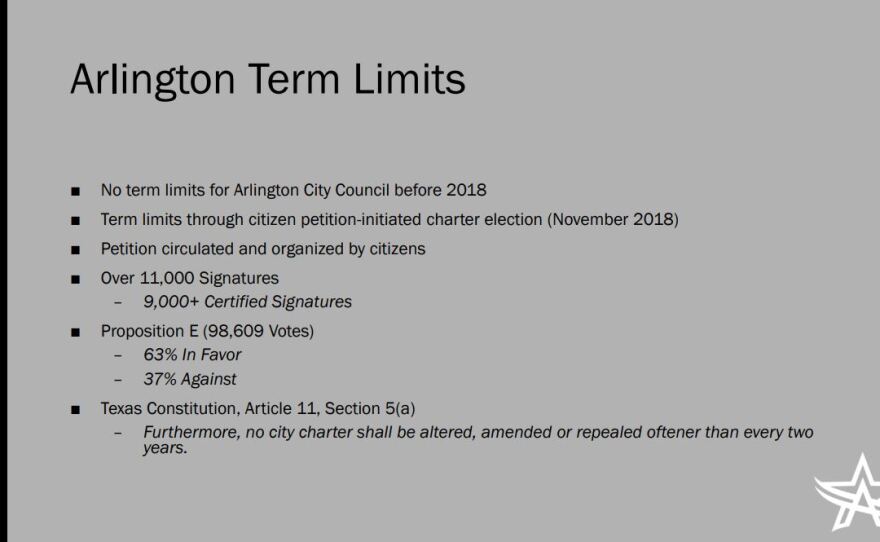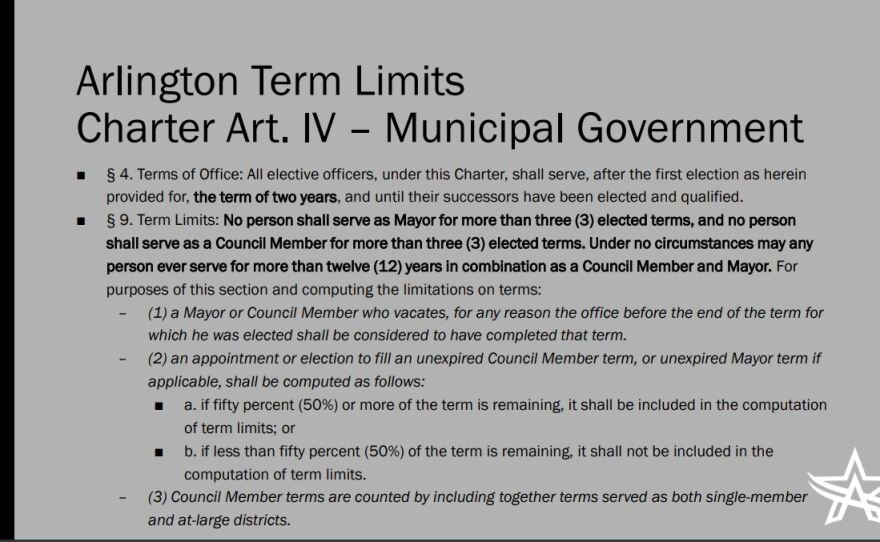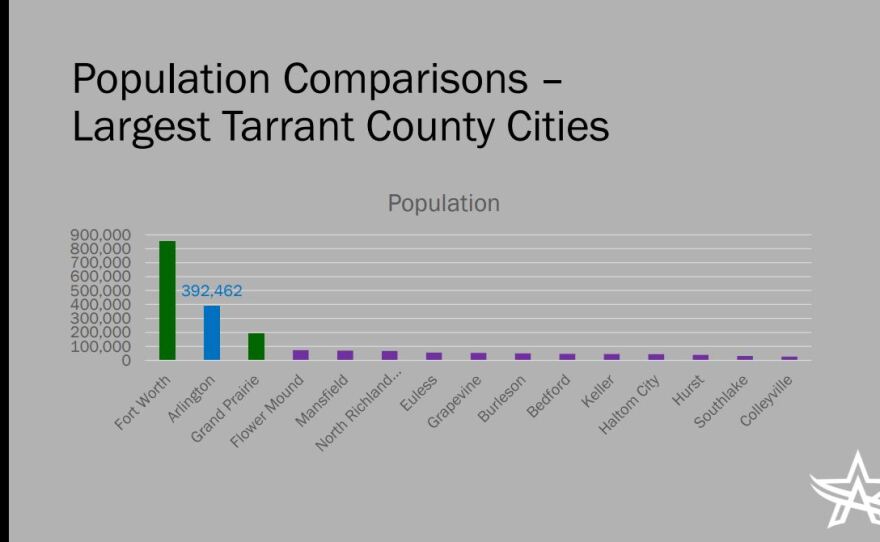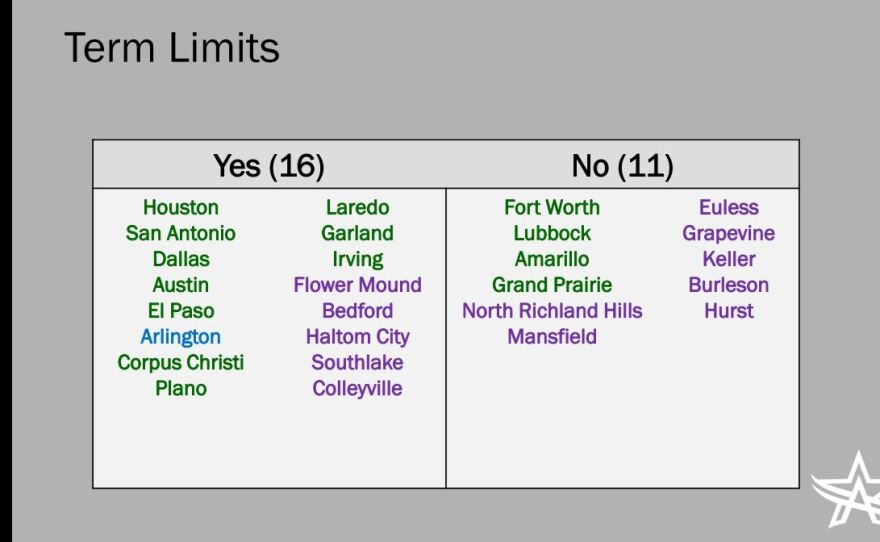If approved, city council members and the mayor would receive three additional years in office than currently allowed by term limits that won voter approval in 2018.
Current term limits cap elected officials at 12 years, meaning Arlington officials can serve no more than six years on city council and six years as mayor.
The ballot item this November would extend council’s term lengths to three three-year terms for each office. Proponents of expanding term lengths argue this extension will give sitting members the time to learn to govern effectively and give them a break from running re-election campaigns every other year.
“With smart term limits, we can also make sure that we have a well-managed City Hall directed by experienced elected leaders that understand the often complex decisions involved with attracting new businesses and jobs to Arlington, improving roads and city services and finding responsible ways to reduce our property tax rates,” wrote Greater Arlington Chamber of Commerce President and CEO Michael Jacobson on the “Vote Yes Arlington” website.
But for the people who championed the 2018 ballot measure that put term limits on the ballot four years ago, the proposal is the latest attempt to undo the will of voters.
Zachary Maxwell, who led the petition drive for current term limits, told KERA in an August interview that council’s decision to bring the question back to voters marks the third time the council has tried to make changes.
“This is just another example of council doing something that appears to be a very rushed, self-serving decision that was not taken to the public at all before it was put to a ballot,” he says.
Thomas Marshall, a political science professor at UT Arlington, called the term length proposal’s chances of passing a “longshot.”
“I’d rank this one as pretty much a longshot. There is decided opposition to it, it’s failed once before. By the way, this is a high turnout year in which voters seem not very happy with things and the direction of the way things are going now,” he says. “It’s not the optimum place to pass this bill.”
Why these term limits?
The three, three-year term limits proposed this November resemble term limits that former Mayor Jeff Williams and previous city council members approved in 2018 to rival the six-year limit. The proposal would have also allowed sitting council and mayor to serve another nine years.
Maxwell obtained a temporary restraining order that removed the ballot measure. He argued in the lawsuit that Arlington leaders did not have enough readings of the measure to put it on the ballot. Council backed down during an unprecedented Sunday evening meeting, according to the Fort Worth Star-Telegram.
Mayor and council received batches of emails this summer that urged officials to bring back the three, three-year term proposition.
Larry Fowler, who led the email drive, wrote that the city is losing council members just as they are beginning to fully understand how to run a city.
“I would suggest that nine years would be a more suitable maximum time limit,” he wrote. “Don’t misunderstand. I am not advocating for doing away with term limits. It is very clear that a majority of the citizens of Arlington support term limits. I am simply saying that I believe the term limit ordinance needs to be tweaked.”
Mayor Jim Ross says in a phone interview that he received 30-50 emails on the subject. He says he didn’t get 11,000 emails to rival the 2018 petition’s 11,000 signatures, but the emails were enough for council to discuss and vote on putting the issue on the ballot.
“Had the citizens had the votes on council to get it on the ballot (in 2018), they could’ve done that,” he says.
Even so, spectators have questioned the timing and decision.
Scott Tillman, field director with the group U.S. Term Limits, says it’s common for officials to fight term limits.
“They’re trying to use this as an in run-around the term limits that were citizen-approved,” Tillman says. “They don’t want to come back to the people and say, ‘Hey, we don’t like the term limits, we want to stay for three extra years.’”
Marshall says the argument that elected municipal officials do not have enough time to learn is “flawed.”
“It’s hard to make the argument that it’s going to take them three, four, five years to figure out where they’re supposed to go for meetings,” he says. “These are people who have long-term professional and business and political ties and neighborhood community groups. I think that Arlington’s argument is not only late, but it’s somewhat flawed in its persuasiveness.”
Term limits are popular. Are they effective?
Term limits are appealing to voters, says Adam McGlynn, political science professor at East Stroudsburg University in Pennsylvania. His research suggests that restrictions on time and office don’t necessarily translate into better governance.
“It’s definitely a winner with voters, but again, in practice, in terms of actually governing, it’s hit or miss,” he says.
A 2010 study he coauthored, McGlynn found little evidence legislative term limits made a difference in taxes or debt. Term-limited mayors did, however, tend to spend less on projects.
People are more likely to notice their representatives’ projects than the ways they save them money, McGlynn says.
“You can show them a spreadsheet that, ‘Oh, look, the budget’s gone down outside of being able to enact a real tax increase, which is greater efficiency.’ It’s more difficult to run on that and be able to get reelected versus, again, more spending and you can show projects that benefit your community,” McGlynn says.
Term limits are effective in rotating leaders, a priority for U.S. Term Limits. Tillman says Arlington’s limits are a solid model of limits on people in office.
“There are some term limits that get passed that are very weak and watered down, so we were glad to see that that was not one of those,” Tillman says of Arlington’s current terms.
Arlington term limits have been called the most restrictive in the United States. According to a 2020 presentation by the Texas Municipal League (TML) to the Arlington Term Limits Advisory Committee, Arlington is one of five major Texas cities to have caps on the total amount of years in office. Laredo, San Antonio and Houston cap elected officials’ lifetime terms ranging from 8 to 10 years per position.
Many, including Dallas, Plano, Bedford and Garland, have a “cooling-off period,” or can run again after sitting out for a prescribed number of years or elections.
Why the Arlington controversy?
Current term limits won nearly 63% of the 98,609 votes cast in November 2018—both before and after various attempts, many by city council, to prevent the outcome or reapproach the topic.
Arlington resident Robert Johnson filed a lawsuit months after the 2018 vote. He claimed voters were misled about how the results would affect sitting incumbents, according to CBS News reporting.
Applications for a committee to review and suggest alternatives to the approved term limits launched in October 2018, though city council would not appoint committee members until summer 2020. The term limits advisory committee, steeped in criticism from opponents and organizers behind the 2018 vote that they were undermining the will of residents, recommended asking voters to approve four, two-year terms and allowing termed-out council members to run again after two years.
Ross says he’s feeling the two-year term limits distract council members from city issues as they focus on re-election.
“City council, the mayor are still almost continuously in campaigns and that makes things really difficult to focus on what you need to do for the city,” he says.
Ross says he considers how the ballot item got on the November ballot doesn’t matter. What matters is that voters have another choice to make.
“The results are the same: the citizens still have the ultimate say. How it gets on the ballot is really irrelevant when the citizens get the ultimate say on things,” Ross says.
However, Marshall says, the question remains one that some voters feel they’ve already answered.
“There are a large number of community groups who are either actively opposed to it or are pretty unenthusiastic about it,” he says.
Got a tip? Email Kailey Broussard at kbroussard@kera.org. You can follow Kailey on Twitter @KaileyBroussard.
KERA News is made possible through the generosity of our members. If you find this reporting valuable, consider making a tax-deductible gift today. Thank you.





















